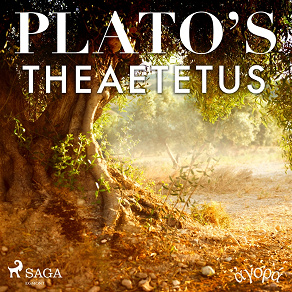
Isbn:
978-87-2642-560-4
Förlag: Saga Egmont
Kategori:
Filosofi
Tillgänglig sedan: mars 2020
Uppläsare:
William Sigalis
Al Anderson
Aidan Anderson
Barth Anderson
Jerry Anderson
Length: 3 timmar 12 minuter
Förlag: Saga Egmont
Kategori:
Filosofi
Tillgänglig sedan: mars 2020
Uppläsare:
William Sigalis
Al Anderson
Aidan Anderson
Barth Anderson
Jerry Anderson
Length: 3 timmar 12 minuter
Ljudbok
Plato’s Theaetetus
Perception, memory, truth, and knowledge all play major roles in this dialogue. What is remarkable about Plato’s treatment of those ideas is how contemporary are both the questions and the answers he puts in the mouths of his characters. Socrates is adamant in asserting that he does not know the answers but that his function is simply to help formulate and critically examine the doctrines presented by others. While he was still alive, the great sophist Protagoras was a friend of Theodorus who has subsequently given up abstract philosophical inquiry and now teaches mathematics, astronomy, and logic to young people such as Theaetetus, the most gifted student he has ever encountered. Socrates examines young Theaetetus to determine whether or not what he has learned from Theodorus provides wisdom and truth. The analogies and metaphors that emerge during their conversation foreshadow the theories of mind favored by contemporary cognitive scientists, but Plato’s dialogue also raises serious doubts about the cogency of those explanations.
Plato lived in Athens, Greece. He wrote approximately two-dozen dialogues that explore core topics that are essential to all human beings. Although the historical Socrates was a strong influence on Plato, the character by that name that appears in many of his dialogues is a product of Plato’s fertile imagination. All of Plato’s dialogues are written in a poetic form that his student Aristotle called “Socratic dialogue.” In the twentieth century, the British philosopher and logician Alfred North Whitehead characterized the entire European philosophical tradition as “a series of footnotes to Plato.” Philosophy for Plato was not a set of doctrines but a goal — not the possession of wisdom but the love of wisdom. Agora Publications offers these performances based on the assumption that Plato wrote these works to be performed by actors in order to stimulate additional dialogue among those who listen to them.
Plato lived in Athens, Greece. He wrote approximately two-dozen dialogues that explore core topics that are essential to all human beings. Although the historical Socrates was a strong influence on Plato, the character by that name that appears in many of his dialogues is a product of Plato’s fertile imagination. All of Plato’s dialogues are written in a poetic form that his student Aristotle called “Socratic dialogue.” In the twentieth century, the British philosopher and logician Alfred North Whitehead characterized the entire European philosophical tradition as “a series of footnotes to Plato.” Philosophy for Plato was not a set of doctrines but a goal — not the possession of wisdom but the love of wisdom. Agora Publications offers these performances based on the assumption that Plato wrote these works to be performed by actors in order to stimulate additional dialogue among those who listen to them.
Provlyssna
Logga in för att låna
Information
Stöds av följande plattformar
PC/Mac
Smartphone
